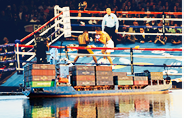 |
UN's Human Rights Agency moves to control the oceans under the banner of social justice
The United Nations is making a power grab to control life in detail on the high seas under the banner of human rights, social justice and protecting the planet from "destruction", according to Forbes magazine.
The article is by Nishan Degnarai, former chairman of the World Economic Forum’s Global Agenda Council, who describes himself as a "development economist", and currently works for "leading Silicon Valley technology companies".
Mr Degnarai says the sharp end of the initiative will come through the UN’s Human Rights Agency (UNOHCR), which has launched an investigation into "human rights abuses associated with the global shipping industry and exposure to toxic chemicals without prior consent".
|
 |
Nationalism and geopolitics stall Colombo port’s development, though mega trends stand to help
Public policy - shipping policy included - has always been complex and contradictory in Sri Lanka, formerly Ceylon, the island nation off the southern tip of India.
Even its post-colonial name - Democratic Socialist Republic of Sri Lanka - illustrates this. If it is democratic, then its people are free to choose what system of government they prefer. But they are also constitutionally obliged to remain socialist and thus denied the choice democracy would ensure.
Sri Lanka's highly democratic ways often leaves the separately elected president from one party at odds with the prime minister, who often heads the party of a rival.

|
 |
China expects its own 'Monroe Doctrine' to be respected and enforced in the eastern Pacific
AS China becomes the world's biggest economy, it now seeks the respect for its own version of the Monroe Doctrine that confers upon the United States undisputed dominance over the Americas. This, China wants for itself in the Pacific.
Such is the conclusion of an essay in London's Economist, arguably the leading economic periodical in the Anglosphere. As early as 1823, US President James Monroe "laid out as policy that refused to "countenance any interference in the Western hemisphere by colonial powers; all incursions would be treated as acts of aggression", said the Economist essay.
"Conceptually, what China wants in East Asia seems akin to a Monroe Doctrine: a decrease in the influence of external powers that would allow it untroubled regional dominance." 
|
 |
Can the rise of US Gulf Ports driven by mega ships from enlarged Panama Canal divert cargo of rivals?
The fruits of the Panama Canal expansion have long been expected, even actively anticipated by the Port of Savannah with its aggressive marketing of the all-water route from Asia more than a decade ago.
On Savannah's coattails came the ports of Virginia and the Carolinas, after the Georgia Port Authority (GPA) cleared the way through 13 years of tortuous environmental litigation before dredging could begin to be street legal.
But rivals need not wait. Not with Obama's TIGER (Transportation Investment Generating Economic Recovery Tiger) grants and the full blessing of US Army Corps of Engineers, dredging approvals came through at warp speed.

|
|
|
|